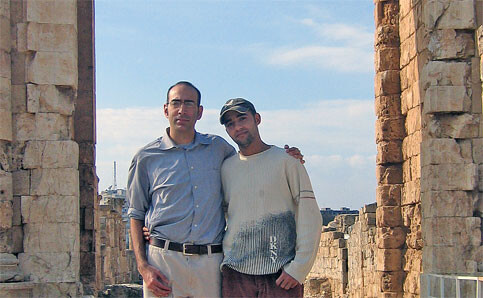Electronic Lebanon Shatila refugee camp, Beirut 6 August 2006

Ussama Abu el-Sheikh (right) and Ali Abunimah at the Roman Ruins in Tyre, Lebanon, 19 November 2005
My name is Usama Abu el-Sheikh, and I am from Tabaria, Palestine. I am of course a refugee and have never been to my hometown in Palestine though I learned about it from my grandparents and I read some books about it. I have never been to Tabaria, but I am Tabarian, and will remain so, as I am from Shatila too and will remain so. Although I always dreamt of corresponding with my country and my hometown to see if I still have relatives there, I was unable to because there is no mail between Lebanon and the State of Israel. Ironically, only the missiles of Hizbullah can be sent to Israel. We are not allowed to return, but the missiles go where we cannot. But how can you send love to Tabaria with a missile?
I am nineteen now, and I grew up in Shatila camp. As a child I wanted to be many things, sometimes a doctor, other times an engineer or a journalist. As a child, you know, I could dream whatever I wanted to and I wanted to be many things. As I was growing up though, my dreams started to be hit by my reality, by my being a refugee in Lebanon where we have no civil rights. Being the oldest son of a widowed mother with seven children and no one to care for after the death of my dad when I was just seven years old, I lived a real struggle inside. My father’s words as he was on his death bed asking me to “care for the family” are words that keep echoing in my head. I got to be the “man of the household” without choosing it, without knowing it. As a child, it was ok, but as I was getting to be a teenager, I wanted always to fulfill this responsibility, always. I was not able to stand the fact that I’m not fulfilling my responsibility as the head of the household. My mum, like all Palestinian mothers, wanted me to get my education. For her it was the way to help the family out, because the identity “educated” is kind of a compensation of our lost identity as Palestinians — not lost in terms of our own feelings but in terms of how the world deals with us. It was hard to focus though, especially because I couldn’t see a future. How could I be a doctor in a country where we have no rights? So I left school, and now I work in a telephone calling shop in the camp.
Maybe you are wondering why I am writing to you about my personal life at a time of war. I just wanted to express that this war reinforced my ideas that what we need is a collective solution for everyone, not individual solutions such as are offered here and there. Just as being “educated” will not replace my loss of identity, a solution for Palestine, separate from Lebanon or Syria or Iraq is not going to be possible. I sit in the camp and think about how much effort is put to separate us all from each other. And now we have the F-16s over our heads joining us together all in one camp. I do not mean Shatila camp, but a much bigger camp for all those whose lives are cheap in this world, the camp of those who die like bugs, the camp for those on whom they test their weapons. As proud as I am of Lebanon’s resistance, I do not think I will be returning to Palestine soon. I will keep sending my love to my hometown in Palestine. I know that the world never hears our cries. But they do hear the roar of the missiles. Can you send love on a missile?
With love from Shatila.
Related Links
Ussama Abu el-Sheikh lives in Shatila refugee camp, Beirut, Lebanon.

